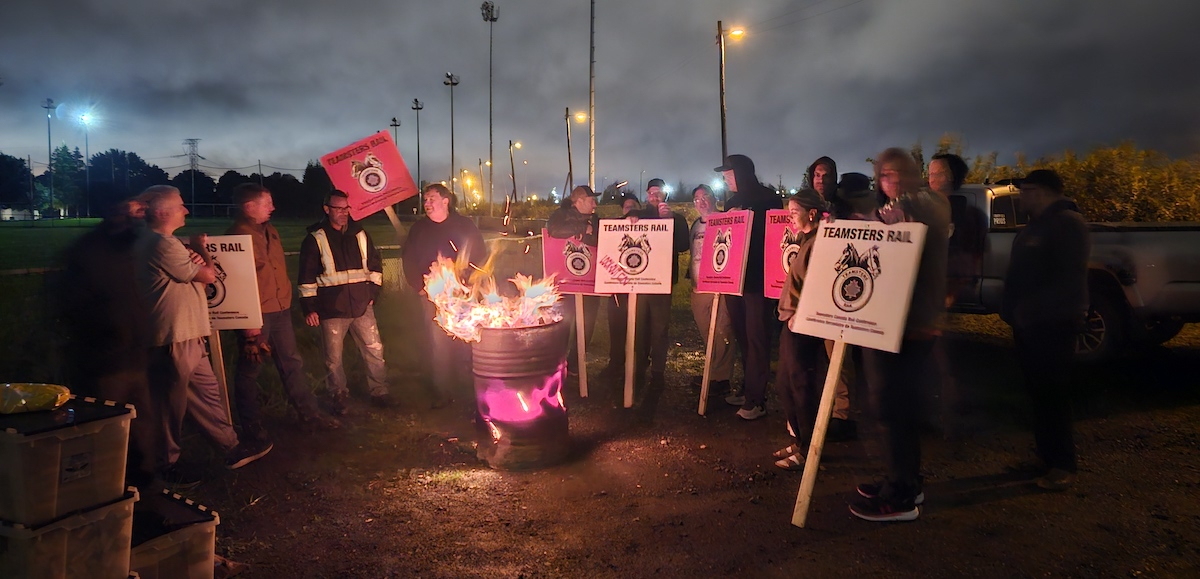Canada Ends Lockout of Rail Workers

Canadian rail workers who are Teamsters members were locked out because they refused to buckle to company demands for unsafe and inhumane scheduling. Photo: IBT Canada.
UPDATE, August 22: The lockout was not even a day old when the government moved to end it with a back-to-work order and initiate binding arbitration. —Editors
Ten thousand Canadian railroad workers were locked out early this morning after two sets of major contracts expired.
Canadian National (CN) and Canadian Pacific Kansas City (CPKC) forced out locomotive engineers, conductors, and yard workers who are organized under the Teamsters Canada Rail Conference.
The major issues for the unions are scheduling and rest period protections in the contracts—areas where they say the railroads are demanding concessions.
Through contracts and governmental regulations, union members have maintained some level of protection against increasingly demanding schedules. Workers have the right to rest periods between shifts and protections around how many hours they can be forced to work.
The union says that management wants to gut these types of protections, and also to force workers to temporarily relocate to other parts of the country to fill staffing shortages.
HISTORY OF STRIKING
Strikes are a regular occurrence on the Canadian railroads, though lockouts aren’t. CPKC workers struck in 2012, 2015, 2018, and 2022. CN workers last struck in 2019.
It’s also unusual for both of these companies to be shut down at the same time, as they typically bargain on different timelines. A one-year contract extension at CN in 2022 led to its contracts lining up with CPKC, which expired in 2023. The Teamsters Canada Rail Conference has been in negotiations since then.
Like U.S. railroad workers, Canadian railroad workers are divided into different unions by craft.
Track maintenance workers at CN, for example, are members of the Steelworkers, who settled a contract covering 2,500 workers in April. But the Teamsters make up the largest group at CPKC and CN.
EMPLOYER OFFENSIVE
A railroad management philosophy called “Precision Scheduled Railroading” was pioneered at CN and then Canadian Pacific by former CEO E. Hunter Harrison.

SUPPORT LABOR NOTES
BECOME A MONTHLY DONOR
Give $10 a month or more and get our "Fight the Boss, Build the Union" T-shirt.
PSR has led to layoffs for tens of thousands of railroad workers—and often-unbearable working conditions for those who remain. It requires longer, less predictable shifts for train crews, with less rest time between shifts.
According to a statement by the union, “many [workers] need to remain available and on call for almost 24 hours a day, seven days a week. Once called in, they have only two hours to report to work, often without knowing when they will be able to return home (the same day, the next day, or even later.).”
PSR has spread to U.S. railroad too, and scheduling like this was a central complaint of U.S. railroad workers in the negotiations that ended in 2022—left largely unresolved in the contracts forced on them by the U.S. government.
WHAT’S NEXT?
CN has publicly requested to settle the contract in arbitration; CPKC has not. The unions have rejected the call, saying they want to negotiate a contract instead.
The Canadian government could force arbitration—or force a contract—through “back-to-work” legislation, as a Conservative government did to CP workers after a nine-day strike in 2012. CP and striking workers agreed to binding arbitration in 2015 under threat of back-to-work legislation.
A long list of North American agricultural industry groups with names like the American Soybean Association and the Midwest Dry Bean Coalition have signed onto a letter urging the Canadian government to intervene.
The Canadian government has not forced rail workers back to work since the centrist Liberal party won power, though it did force back postal strikers in 2018.
The divide between the union and the railroads is potentially harder to resolve than a more straightforward wage dispute. According to both the union and the companies, what’s at stake is more fundamental, and they remain far apart.
In its statement announcing the lockout, CPKC called the union’s scheduling demands “unrealistic” and said that they “would fundamentally impair the railway’s ability to serve our customers.” In its own statement, CN stated that “the Teamsters have not shown any urgency or desire to reach a deal that is good for employees, the company and the economy.”
“Rail workers have fought for a safer and more humane industry for decades,” Teamsters Canada Rail Conference President Paul Boucher said in a statement, “and we will not accept moving backwards.”






